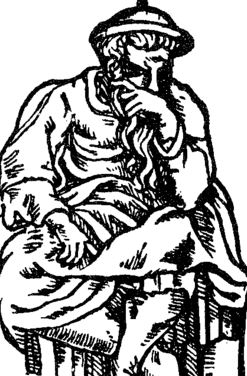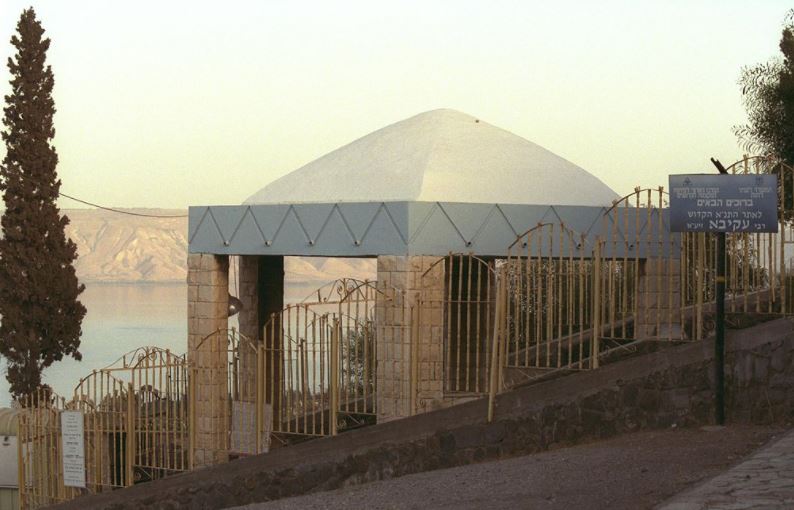The Greatest Rabbi of All Time?

An illustration of Rabbi Akiva in the 16th century Mantua Haggadah
Akiva ben Yosef (d. 135 CE) was born in Israel to a poor family in the last years of the Second Temple, possibly the grandson of converts to Judaism. Despite being unlearned and impoverished, he fell in love with Rachel, the daughter of one of Jerusalem’s wealthiest men (and his employer). Rachel agreed to marry Akiva on the condition that he would eventually go to study. Her father rejected her choice, and the couple lived in extreme poverty. Finally, aged 40, Akiva enrolled at the yeshiva of Lod, without even knowing the Hebrew alphabet. He returned home only twelve years later, but upon nearing the door of his home, overheard his wife say to a neighbour that if it were up to her, her husband would study for another twelve years. Akiva thus went back to Lod for another dozen years, by the end of which he had become a renowned rabbi with some 24,000 students. This time, he returned home to a huge procession and an adoring crowd. His wife tried to get through and was blocked by his students. Rabbi Akiva famously told them: “Leave her alone, for what is mine and yours, is hers.” His father-in-law recognized the huge mistake he had made, and ended up leaving his fortune to the sage. Rabbi Akiva is credited with setting the foundations of Judaism as we know it. He completed the codification of the Tanakh, and commissioned Aquila of Sinope to produce a new accurate translation of the Torah into Greek – an indispensable tool for the Jewish majority at the time. He helped to quell a number of heretical movements, and ensured the survival of traditional Judaism in the face of the new Christian sect. Some even see him as one of the earliest feminists: it was Rabbi Akiva that banned the practice of separating women from society during their days of menstruation. He also spearheaded the abolition of both slavery and capital punishment in Israel. Rabbi Akiva taught that the most important Torah principle was loving your fellow, and unraveled new techniques in Torah interpretation. (One legend has it that God showed Moses a vision of Rabbi Akiva’s future classroom, and it was so deep that Moses did not understand any of it and began to cry!) Rabbi Akiva also participated in the Bar Kochva Revolt in an attempt to re-establish an independent Jewish kingdom and rebuild the Holy Temple. Unfortunately, the revolt failed with catastrophic results. All of Rabbi Akiva’s students perished. The rabbi was able to find five new students and transmit the Torah to them before his own cruel death at the hands of the Romans. This act is sometimes credited with saving Judaism from extinction. One of those five students was Rabbi Shimon bar Yochai, the traditional author of the Zohar, and the first to publicly reveal the vast mystical dimensions of Judaism. (These teachings he learned from Rabbi Akiva, who was such a great mystic himself that the Talmud states he was the only sage to ascend to the Heavens and return to Earth unscathed.) Rabbi Akiva set the stage for the compilation of the Mishnah, and its eventual evolution into the Talmud. His kindness was legendary, as was his love for Israel – both the nation and the land. He died defending both, being flayed with iron combs by the Romans. He prayed until his last breath, which stunned both his executioner and his students, who asked how he was able to praise God at such a moment. His reply: “All my life I was worried about the verse, ‘[to love Him] with all your soul’ …And I said to myself, when will I ever be able to fulfill this command? And now that I am finally able to fulfill it, I should not?” He then recited the Shema, and just as the last word “echad” left his lips, his soul departed his body. Some scholars title him “the father of Rabbinic Judaism”.
Words of the Week
One of the gifts of Jewish culture to Christianity is that it has taught Christians to think like Jews… Any modern man who has not learned to think as though he were a Jew can hardly be said to have learned to think at all.
– Lord William Rees-Mogg

Rabbi Akiva’s Tomb in Tiberias, Israel

 Dennis Mark Prager (b. 1948) was born in New York City to an Orthodox Jewish family. He attended religious schools, and during his time at the Yeshiva of Flatbush met the future renowned rabbi Joseph Telushkin. Prager majored in history and Middle Eastern studies at Brooklyn College before spending several years at Columbia University studying both the Middle East and Russia, followed by a stint at the University of Leeds learning Arabic and comparative religions. In the mid-70s, Prager teamed up with Rabbi Telushkin to co-author The Nine Questions People Ask About Judaism. The bestselling book was a huge success and shot Prager into the spotlight. Shortly after, he was hired to be the director of the Brandeis-Bardin Institute of the American Jewish University. (He would later teach Hebrew Bible at the University between 1992 and 2006.) In 1982, he met an executive of Los Angeles’ KABC Radio who was struck by Prager’s impressive knowledge, and instantly hired him to host a Sunday radio show called Religion on the Line. It was so popular that Prager was soon doing radio shows every day except Friday and Saturday (because of Shabbat). Meanwhile, he co-authored another bestseller with Rabbi Telushkin, Why the Jews? The Reason for Antisemitism. By 1999, Prager’s radio show was nationally syndicated, as was his newspaper column. He was called “One of America’s five best speakers”, as well as “one of the three most interesting minds in American Jewish Life”, and was described by the LA Times as “An amazingly gifted man and moralist”. All in all, Prager has published seven books (including The Ten Commandments: Still the Best Moral Code) and produced five films (including Israel in a Time of Terror, and the forthcoming No Safe Spaces about the extremes of political correctness). He continues to host one of America’s most popular radio shows, and is among the most sought-after political commentators in the world. Today, Prager is perhaps most famous for his Prager University, which he co-founded in 2009 in response to the growing trend of squashing conservative voices in the media and on campus. PragerU’s concise and informative five-minute videos have become hugely popular. To date, they have garnered over 1 billion views, with hundreds of millions of followers across social media sites. The videos have been so successful that PragerU has been called “the right-wing YouTube empire that’s quietly turning millenials into conservatives.” Perhaps because of this, Google recently started blocking some of PragerU’s videos, perplexingly citing them as “inappropriate”. Regardless of whether one agrees with Prager’s views or not, the blatant suppression of free speech sets a dangerous precedent. For this reason, Prager has launched a lawsuit against Google and YouTube, together with a campaign to draw support for the preservation of free speech (see their video,
Dennis Mark Prager (b. 1948) was born in New York City to an Orthodox Jewish family. He attended religious schools, and during his time at the Yeshiva of Flatbush met the future renowned rabbi Joseph Telushkin. Prager majored in history and Middle Eastern studies at Brooklyn College before spending several years at Columbia University studying both the Middle East and Russia, followed by a stint at the University of Leeds learning Arabic and comparative religions. In the mid-70s, Prager teamed up with Rabbi Telushkin to co-author The Nine Questions People Ask About Judaism. The bestselling book was a huge success and shot Prager into the spotlight. Shortly after, he was hired to be the director of the Brandeis-Bardin Institute of the American Jewish University. (He would later teach Hebrew Bible at the University between 1992 and 2006.) In 1982, he met an executive of Los Angeles’ KABC Radio who was struck by Prager’s impressive knowledge, and instantly hired him to host a Sunday radio show called Religion on the Line. It was so popular that Prager was soon doing radio shows every day except Friday and Saturday (because of Shabbat). Meanwhile, he co-authored another bestseller with Rabbi Telushkin, Why the Jews? The Reason for Antisemitism. By 1999, Prager’s radio show was nationally syndicated, as was his newspaper column. He was called “One of America’s five best speakers”, as well as “one of the three most interesting minds in American Jewish Life”, and was described by the LA Times as “An amazingly gifted man and moralist”. All in all, Prager has published seven books (including The Ten Commandments: Still the Best Moral Code) and produced five films (including Israel in a Time of Terror, and the forthcoming No Safe Spaces about the extremes of political correctness). He continues to host one of America’s most popular radio shows, and is among the most sought-after political commentators in the world. Today, Prager is perhaps most famous for his Prager University, which he co-founded in 2009 in response to the growing trend of squashing conservative voices in the media and on campus. PragerU’s concise and informative five-minute videos have become hugely popular. To date, they have garnered over 1 billion views, with hundreds of millions of followers across social media sites. The videos have been so successful that PragerU has been called “the right-wing YouTube empire that’s quietly turning millenials into conservatives.” Perhaps because of this, Google recently started blocking some of PragerU’s videos, perplexingly citing them as “inappropriate”. Regardless of whether one agrees with Prager’s views or not, the blatant suppression of free speech sets a dangerous precedent. For this reason, Prager has launched a lawsuit against Google and YouTube, together with a campaign to draw support for the preservation of free speech (see their video,  Aharon Yehuda Leib Shteinman (1914-2017) was born in what is now the city of Brest, Belarus. To avoid being conscripted into the Polish army, the young yeshiva student fled to Switzerland with some classmates. He continued his diligent studies in a Swiss yeshiva until being arrested during World War II and sent to a labour camp. Shteinman was the only member of his family to survive the Holocaust. He settled in Israel after the war. There, the young rabbi quickly made a name for himself as a Torah prodigy, and was soon appointed rosh yeshiva, head of a Torah academy. He would serve as a rosh yeshiva for the next five decades, while also establishing a number of children’s schools for the underprivileged. Meanwhile, Rav Shteinman wrote profusely, authoring dozens of bestselling books and discourses on Torah, Talmud, and Jewish thought, as well as being recognized as an expert in the field of education. While abstaining from politics himself, Rav Shteinman was the spiritual leader of Israel’s Degel HaTorah party, playing an influential role in government. In his 90s, and in frail health, the Rav decided to journey around the world to strengthen Jewish communities. Countless thousands gathered to greet him and hear his wise words in Los Angeles, New York, Mexico City, Buenos Aires, Manchester, Odessa, Berlin, Gibraltar, Paris, and many more small towns. On these trips, he would give as many as 10 talks a day.
Aharon Yehuda Leib Shteinman (1914-2017) was born in what is now the city of Brest, Belarus. To avoid being conscripted into the Polish army, the young yeshiva student fled to Switzerland with some classmates. He continued his diligent studies in a Swiss yeshiva until being arrested during World War II and sent to a labour camp. Shteinman was the only member of his family to survive the Holocaust. He settled in Israel after the war. There, the young rabbi quickly made a name for himself as a Torah prodigy, and was soon appointed rosh yeshiva, head of a Torah academy. He would serve as a rosh yeshiva for the next five decades, while also establishing a number of children’s schools for the underprivileged. Meanwhile, Rav Shteinman wrote profusely, authoring dozens of bestselling books and discourses on Torah, Talmud, and Jewish thought, as well as being recognized as an expert in the field of education. While abstaining from politics himself, Rav Shteinman was the spiritual leader of Israel’s Degel HaTorah party, playing an influential role in government. In his 90s, and in frail health, the Rav decided to journey around the world to strengthen Jewish communities. Countless thousands gathered to greet him and hear his wise words in Los Angeles, New York, Mexico City, Buenos Aires, Manchester, Odessa, Berlin, Gibraltar, Paris, and many more small towns. On these trips, he would give as many as 10 talks a day. Rav Shteinman was known for his extreme piety, humility, and modesty. His daily diet was nothing but a cucumber, a boiled potato, and one small bowl of oatmeal. He lived in a tiny apartment, with little furniture but walls lined end to end with books. He slept on the same thin mattress that was given to Jewish refugees upon arrival in Israel for some 50 years. Streams of people lined up at his open door each day seeking counsel and blessings. Rav Shteinman stood only for truth, even when it brought him adversity. This was particularly clear when he supported the Nachal Charedi, an IDF unit for yeshiva students. Even after some backlash from ultra-Orthodox communities, the Rav stood his ground and continued his support. He was widely recognized as the gadol hador, the world’s chief rabbi. Sadly, the great rabbi passed away yesterday, at 103 years of age. (His condition had turned critical two weeks ago after the tragic death of his 72-year old daughter from a heart attack, even though no one had told him of her passing.) Rav Shteinman wrote in his will that it would suffice to have just ten men to carry out his funeral, and requested no eulogies. Nonetheless, the funeral procession brought over 600,000 people. Israel’s President Reuven Rivlin stated that Rav Shteinman “bore the entire weight of the Jewish people’s existence on his shoulders… he knew how to convey his ideas gently, in a pleasant manner, and with a great love of the Jewish people… He was a man whose wisdom was exceeded only by his humility.”
Rav Shteinman was known for his extreme piety, humility, and modesty. His daily diet was nothing but a cucumber, a boiled potato, and one small bowl of oatmeal. He lived in a tiny apartment, with little furniture but walls lined end to end with books. He slept on the same thin mattress that was given to Jewish refugees upon arrival in Israel for some 50 years. Streams of people lined up at his open door each day seeking counsel and blessings. Rav Shteinman stood only for truth, even when it brought him adversity. This was particularly clear when he supported the Nachal Charedi, an IDF unit for yeshiva students. Even after some backlash from ultra-Orthodox communities, the Rav stood his ground and continued his support. He was widely recognized as the gadol hador, the world’s chief rabbi. Sadly, the great rabbi passed away yesterday, at 103 years of age. (His condition had turned critical two weeks ago after the tragic death of his 72-year old daughter from a heart attack, even though no one had told him of her passing.) Rav Shteinman wrote in his will that it would suffice to have just ten men to carry out his funeral, and requested no eulogies. Nonetheless, the funeral procession brought over 600,000 people. Israel’s President Reuven Rivlin stated that Rav Shteinman “bore the entire weight of the Jewish people’s existence on his shoulders… he knew how to convey his ideas gently, in a pleasant manner, and with a great love of the Jewish people… He was a man whose wisdom was exceeded only by his humility.”